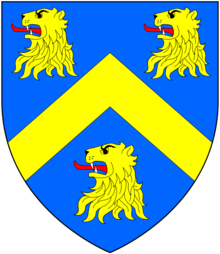Charles Wyndham, 2nd Earl of Egremont
The Earl of Egremont | |
|---|---|
 | |
| Secretary of State for the Southern Department | |
| In office 9 October 1761 – 21 August 1763 | |
| Monarch | George III |
| Prime Minister | The Earl of Bute George Grenville |
| Preceded by | William Pitt |
| Succeeded by | The Earl of Halifax |
| Personal details | |
| Born | 19 August 1710 |
| Died | 21 August 1763 (aged 53) |
| Spouse | Hon. Alicia Maria Carpenter |
| Children | |
| Parent(s) | Sir William Wyndham, 3rd Baronet Catherine Seymour |

Charles Wyndham, 2nd Earl of Egremont, PC (19 August 1710 – 21 August 1763), of Orchard Wyndham in Somerset, Petworth House in Sussex, and of Egremont House in Mayfair, London, was a British statesman who served as Secretary of State for the Southern Department from 1761 to 1763.
Origins
[edit]He was the eldest son and heir of Sir William Wyndham, 3rd Baronet, of Orchard Wyndham, Secretary at War in 1712, Chancellor of the Exchequer in 1713 and Tory leader in the House of Commons during the reign of King George I (1714–1727) and during the early years of King George II (1727–1760).
His mother was Catherine Seymour, daughter of Charles Seymour, 6th Duke of Somerset, and sister of Algernon Seymour, 7th Duke of Somerset, created in 1749 Earl of Egremont and Baron Cockermouth, with special remainder to his nephew Charles Wyndham, the subject of this article.[1]
Inheritance
[edit]He succeeded to the Orchard Wyndham estates and as 4th baronet on his father's death in 1740, and in 1750 succeeded by special remainder as 2nd Earl of Egremont, on the death of his maternal uncle Algernon Seymour, 7th Duke of Somerset, 1st Earl of Egremont, and received, as his share of the Seymour inheritance, the former Percy estates, including Egremont Castle in Cumbria, Leconfield Castle in Yorkshire and the palatial Petworth House in Sussex (rebuilt by the 6th Duke[2]). These were formerly owned by the Percy family, and had been inherited by the 7th Duke of Somerset from his mother, Lady Elizabeth Percy (died 1722),[3] daughter and heiress of Joceline Percy, 11th Earl of Northumberland.
His younger brother was Percy Wyndham-O'Brien, 1st Earl of Thomond, created Earl of Thomond, having become the chosen heir of his mother's sister's childless husband Henry O'Brien, 8th Earl of Thomond (1688–1741).
Career
[edit]Wyndham served as member of parliament for Bridgwater (Somerset) in 1734–1741, Appleby (Cumberland) in 1741–1747, and for Taunton (Somerset) in 1747–1750.
Seven Years' War
[edit]In October 1761, Egremont was appointed Secretary of State for the Southern Department in succession to William Pitt, 1st Earl of Chatham. His term of office, during which he acted in concert with his brother-in-law George Grenville, was mainly occupied with the declaration of war on Spain and with the negotiations for peace with France and Spain, the terms of which Wyndham seems to have disliked. He was also involved with the proceedings against John Wilkes.[4] He died in office 21 August 1763.
He was Lord Lieutenant of Cumberland 1751–1763 and Lord Lieutenant of Sussex 1762–1763.
Marriage and issue
[edit]On 12 March 1750/51, Wyndham married Hon. Alicia Maria Carpenter, a daughter of George Carpenter, 2nd Baron Carpenter of Killaghy, by his wife Elizabeth Petty. He had progeny including:
- George O'Brien Wyndham (1751–1837), succeeded as 3rd Earl of Egremont.
- Lady Elizabeth Alicia Maria Wyndham (1752–1826), who married Henry Herbert, 1st Earl of Carnarvon, and had children.
- Lady Frances Wyndham (1755–1795), who married Charles Marsham, later Earl of Romney, and had children.
- Lady Charlotte Catherine Wyndham (5 September 1756 – April 1757).[5][6]
- Hon. Percy Charles Wyndham (27 September 1757 – 5 August 1833).[7]
- Hon. Charles William Wyndham (1760 – 1828)
- Hon. William Frederick Wyndham (1763–1828), who married Hon. Frances Mary Harford, daughter of Frederick Calvert, 6th Baron Baltimore, and had children; his second wife was Julia de Smorzewska, Countess de Spyterki, by whom he also had children.
Assessment
[edit]According to the Encyclopædia Britannica Eleventh Edition, Horace Walpole perhaps rated Egremont's talents too low when he said he had neither knowledge of business, nor the smallest share of parliamentary abilities.[4]
References
[edit]- ^ Debretts peerage, 1968, p. 411, Baron Leconfield and Egremont.
- ^ "In 1682 Petworth passed by marriage from the Percies to the 6th Duke of Somerset and it is to him the Proud Duke that we owe by far the larger part of the existing house" (Nicolson, Nigel, Great Houses of Britain, London, 1978, p. 165).
- ^ Debrett's Peerage, 1968, p. 411.
- ^ a b One or more of the preceding sentences incorporates text from a publication now in the public domain: Chisholm, Hugh, ed. (1911). "Egremont, Earls of". Encyclopædia Britannica. Vol. 9 (11th ed.). Cambridge University Press. p. 20.
- ^ The Register of Births & Baptisms in the Parish of St James within the Liberty of Westminster Vol. IV. 1741-1760. 11 September 1756.
- ^ The Register Book of Burials in the Parish of St James in Westminster in the County of Middlesex. Volume IV. 1754-1812. 27 April 1757.
- ^ The Register of Births & Baptisms in the Parish of St James within the Liberty of Westminster Vol. IV. 1741-1760. 2 November 1757.
External links
[edit]- 1710 births
- 1763 deaths
- Secretaries of state for the Southern Department
- Chancellors of the College of William & Mary
- Earls of Egremont
- Lord-lieutenants of Cumberland
- Lord-lieutenants of Sussex
- Members of the Parliament of Great Britain for English constituencies
- Members of the Privy Council of Great Britain
- British MPs 1734–1741
- British MPs 1741–1747
- British MPs 1747–1754
- Wyndham family
- Leaders of the House of Lords
